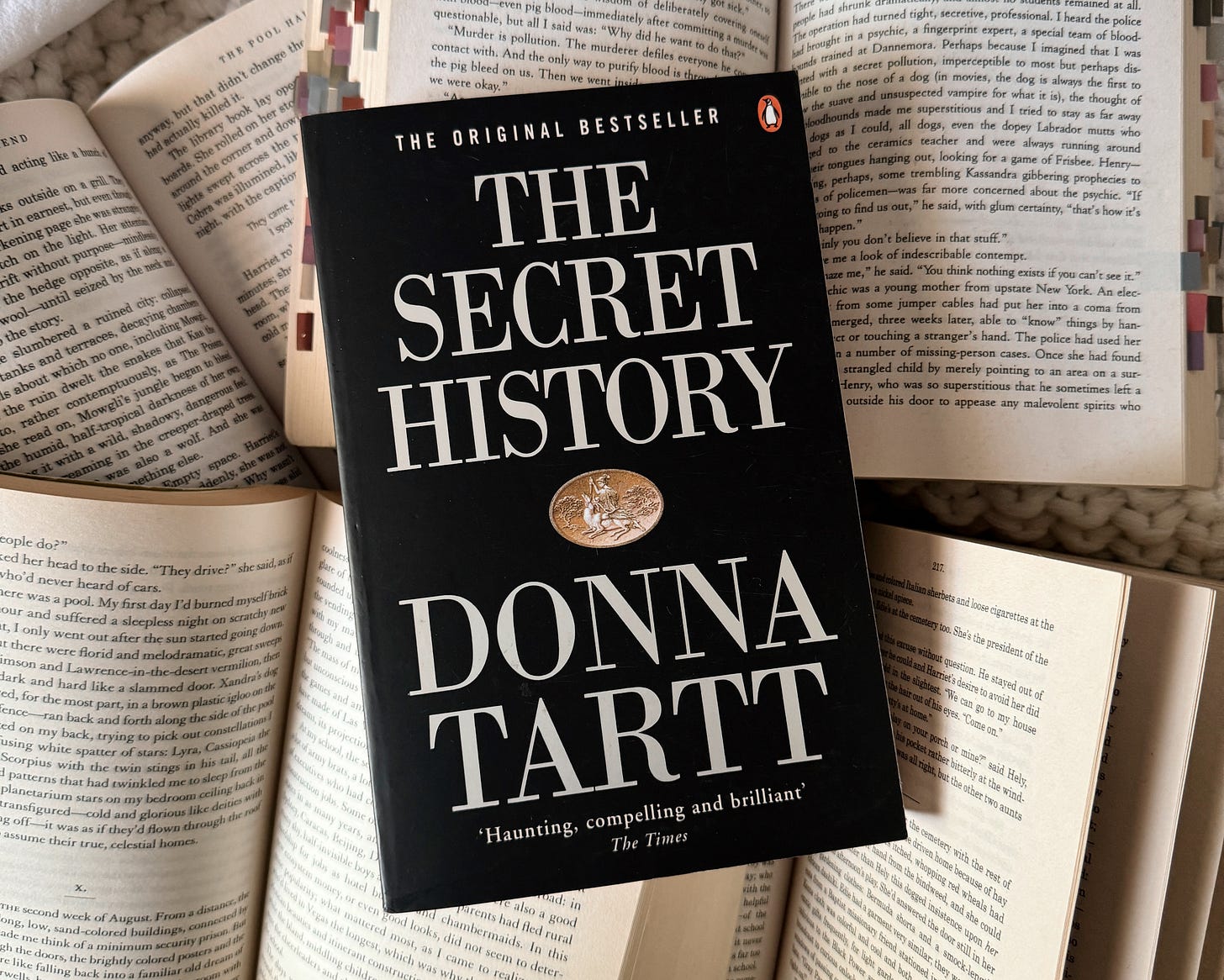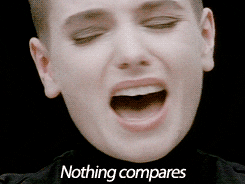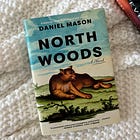nothing compares to The Secret History
and how I’ve spent my entire life trying to find anything else like it
My obsession with dark academia as an aesthetic and as a genre started, as many things do, with Harry Potter.
Harry Potter movies five through seven are dark academia to the core: boarding schools with moody architecture, prep school fashion choices, dark neutral color palettes, candlelight, a perpetual look of boredom, mortal danger, libraries.
But HP didn’t invent the genre. The true Mother of Dark Academia is Donna Tartt. Her supreme spawn is The Secret History. And there has never been anything like it since.
I first read The Secret History sometime after college but before COVID (that’s how we tell time now, right?). There’s a Goodreads entry on my Read shelf in December of 2017, but I am certain the reading was more like 2014, mostly because what I was doing in 2017 involved a lot more vodka and a lot less reading.
The point is, I don’t remember what led me to pick up The Secret History or even what was happening in my life at the time. All I know is this fiercely ‘90s novel about insufferable students at an elite East Coast college at some point caught my attention and has now completely ruined me for the dark academia genre for the rest of my life. Thanks, Donna.
I’ve read dozens of “dark academia” novels suggested by internet publications of varying degrees of authority. I’ve created dark academia Pinterest boards. I’ve even attempted my own lists. But it’s all a lie. This is a list of one. THERE IS NO OTHER.
No other novel lives up to Tartt standards. I need creeping dread, snobby college students, top-notch fashion, dead languages, subtext, subversion, all the things this newsletter is predicated on. And nothing else lives up to the hype.
Sure, I have read some good “dark academia” books, but nothing is quite right. Ordinary Monsters and Ninth House were great, but they’re fantasy. Some seem to only be on the list as campus novels but lack the dark part (The Marriage Plot, Special Topics in Calamity Physics, The Idiot). Or maybe they’ve got the death thing going but lack the snobbery high-brow-ness (I Have Some Questions for You, The Likeness). These are great books. But they are not The Secret History.
Just take a look at Ms. Donna Tartt. Visually stunning. Sometimes androgynous. Terribly fashionable. Committed to her craft. The embodiment of dark academia.
What people get wrong
Donna Tartt published The Secret History in 1992. It’s about six elite classics students who take their professor’s teachings a bit too literally, going beyond the normal boundaries of consciousness to test their basest desires and ending up in the garden of evil.
I love this book. I chose to reread it for this newsletter, and it took me months to get through because it’s dense and gorgeous and marvelous. It was even better the second time around.
But it is also a controversial book - so many hate its guts. It pains me to hear this blasphemy, but that’s the game, isn’t it?
In a lovely negative review I’ve linked in Further Reading at the end of this essay, the author argues that The Secret History “is devoid of character. There’s plenty of personality, Tartt makes sure of that, but the people are not people. The dialogue feels natural, the heavy style feels settled, but there’s nothing going on beneath the surface. “
Way to hit the nail on the head and still not know what you are hammering!
Once again, I find myself shouting into my phone - EVERYTHING IS GOING ON beneath the surface. That’s where the party is, but you have to pay attention. This book is a study in close reading, understanding subtext, and negative space. The simplest description is a metaphor for the characters’ mental states. Every statement or passage deals with complex themes - appearances as worth, externality vs. internality, descent into madness, and beauty as terror.
Creeping dread (beauty is terror)
I understand how the reviewer might say “The people are not people”. The thing that makes this book a masterpiece is the continuous layer of creeping dread. Our inability to honestly know any character but the narrator, Richard, an unwitting outsider just like us, creates a constant sense of vague apprehension unlike anything I’ve ever read (many attempt, few succeed). Sir! You are correct, these people are not people and that’s why I feel something! I was squinting at the page, looking for more - insight? Understanding? Things? What is happening here? I feel like I’m taking crazy pills!
But you never really get to know Julian or Henry, Francis, Charles, and Camilla. They are like shadows you can’t catch. We know what they look like and what old-fashioned elite prep school outfits they wear and what they chain smoke or drink and if their houses are messy. They speak but mostly off-page; we live in Richard and the things unsaid. We read between the lines and the glances. Back and forth we swivel our heads like watching a tennis match where you can’t ever seem to find the ball.
The story is both cerebral in its themes and base in its plot. You have students studying a completely useless classic language (in any utilitarian sense) caught against the basest of human crimes. My favorite passage in the novel (besides the prologue, which is one of the greatest openings of all time) is a perfect encapsulation of this dichotomy:
“Death is the mother of beauty,” Henry said.
“And what is beauty"?”
“Terror".”
“Well said,” said Julian. Beauty is rarely soft or consolatory. Quite the contrary. Genuine beauty is always quite alarming.”
I looked at Camilla, her face bright in the sun, and thought of that line from the Iliad I love so much, about Pallas Athene and the terrible eyes shining.
“And if beauty is terror,” said Julian, “then what is desire? We think we have many desires, but in fact we have only one. What is it?”
“To live,” said Camilla.
“To live forever,” said Bunny, chin cupped in palm.
The teakettle began to whistle.
Just take a moment to visualize it. See it? That’s the feeling.
Even though Richard is the narrator, Henry is the star. Both villain and hero, martyr and playwright. I won’t say much about him so as not to ruin it, but Tartt does such a phenomenal job of hiding his motivations, just like she hides everything else. Is he a victim of his homelife or a narcissistic psychopath? Is he Juilian’s pawn or a master deceptor?
The supporting cast is top-notch as well. Richard is not completely isolated, so we have people to compare the Weird Five to. Judy Poovey is perhaps the greatest supporting character ever written. A foil to Henry, Judy is irritatingly brash and un-self-aware but actually cares for Richard’s well-being, unlike anyone else.
I’ve done a lot of character study here, but well, that’s what The Secret History is. Tartt also writes the most beautiful sentences, especially describing nature. There is some murder and mystery, which keeps the plot moving, even though she subverts the usual order of things. When we think it’s finally over, we realize there are 200 more pages in this flip-floppiest book. The Secret History is the holy grail, and I hope to write something half as good someday.
So, Donna, I say to you.
I will follow you into the dark.
🖤 For Fans Of: Bret Easton Ellis, campus novels, snobby elitists
⭐ Verdict: Read this when you feel like pretending it’s perpetual fall full of dark libraries, penny loafers, and madness.
Further Reading 📚
I find negative reviews of The Secret History riveting. Someone at the University of Michigan really hated it. I would love to know what kind of books this person does like.
This OG NYT review from 1992 was actually printed on paper.
The Cut’s Anna Silman recommends The Secret History to everyone.
The TikTok dark academia subculture explained.
If you need other campus novel recommendations, I wrote about those here
In Case You Missed It 🖤
This newsletter contains affiliate links. If you purchase using one of the links above, I will earn a baby-sized commission at no cost to you. Comment, share, repost, upgrade to paid, or buy me a coffee to support my work. Follow me @ thebookcreep on Instagram for pretty book pictures. Your support (monetary or not) is why I keep going, so thank you.
See you around the bookshelf!
Natalie











I've just started to read this for a discussion here on Substack and it feels so Brideshead Revisited to me. Richard keeps saying he's a big fat liar, so I don't know what to believe about anything he's telling us, but I'm interested in what happens with Bunny, so I'm keeping on. Also - I already love Henry. Also - these kids have too much free time, which in my experience is the root of all evil, so I expect a lot of shit to go down.